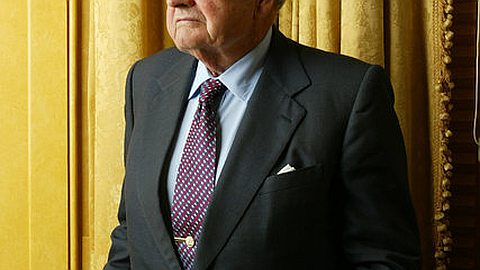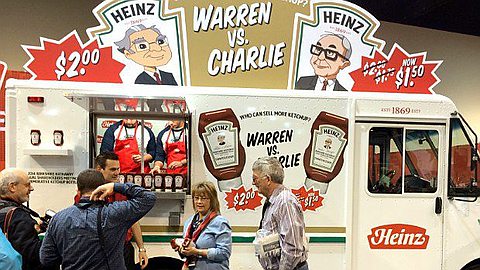To Be Born Poor Doesn't Mean You'll Always Be Poor

At the time—a decade or so before the First World War—Carnegie’s attitude was nearly universal. In America, anyone could carve out a better life for himself if he worked hard. Today, Carnegie’s attitude is considered almost quaint.
Opportunity? Why, opportunity is a rare thing, and those Americans not lucky enough to be born with it should be given it at other people’s expense. Whether it’s an education, a job, a house, or a grant, opportunity is seen as something that others have to provide you with. If you don’t succeed, it’s not because you failed to capitalize on plentiful opportunities. It’s because you just weren’t one of the fortunate few.
Carnegie would have bristled. “My men began in exactly the same station in life which I occupied a few years ago,” Carnegie once observed. “They have had the same privileges for personal advancement that I had.”
It’s hard to imagine anyone beginning in a lower station. Carnegie had arrived in America, a twelve-year-old Scottish immigrant. With barely a penny to his family’s name, and with only five years of formal education behind him (“Lack of schooling is no valid excuse for failure; neither is an exhaustive schooling a guarantee of success,” he would later say), young Andrew went to work at a textile mill, twelve hours a day, for $1.20 a week.
It wasn’t much, but it was enough. The job gave Carnegie the opportunity to learn and to demonstrate his dedication to hard work. Very quickly he moved on and up: less than a year later he had secured a position at O’Reilly’s Telegraph Company, starting at more than twice what he had earned at the mill.
It was there that Carnegie’s rise began in earnest—not through some “lucky break” but through the habit Carnegie would later refer to as “going the extra mile.” Carnegie, still working incredibly long days, began going to work early in order to learn how to send and receive telegraph messages. He worked so hard at it that he could eventually take telegraph messages by ear rather than by transcribing the Morse code—a feat only two other people in America could perform.
That ability helped him gain the notice of Thomas A. Scott, a superintendent for the Pennsylvania Railroad. Scott hired the young man, still a teenager, to be his secretary and telegrapher at $35 a month—a tidy sum at the time and a far cry from $1.20 a week.
Carnegie soon became indispensable to Scott. The real turning point came not too long after he was hired. Carnegie was in the office alone one day when news came of a wreck on the Eastern Division. Rail traffic started backing up; instead of shrugging his shoulders and saying “not my job, not my problem,” Carnegie chose to take action. “Mr. Scott was not to be found,” he would later write. “Finally, I could not resist the temptation to plunge in, take the responsibility, give ‘train orders’ and set matters going.”
It was no easy decision. Although Carnegie had watched Scott deal with similar problems in the past, lives and property were at stake. “I knew it was dismissal, disgrace, perhaps criminal punishment for me if I erred. On the other hand, I could bring in the wearied freight-train men who had lain out all night. I could set everything in motion. I knew I could.” And he did, forging Scott’s signature and issuing orders until rail traffic was back to normal.
Thanks to Carnegie’s determination and hard-won abilities, Scott started opening doors for the young man and teaching him the skills he would need to succeed in business. Later, he would help Carnegie make his first investment, launching Andrew’s career as a capitalist in earnest. By 1860, at the age of 25, Carnegie was making almost $50,000—more than enough to count himself as wealthy.
“Opportunity” means a set of circumstances in which a course of successful action is possible. Opportunity is abundant. What’s scarce is the willingness to take advantage of it. To the extent a country is free, a person with no money, no education, no connections can rise as far as his ability and ambition will take him. But developing ability and ambition is a challenging, uncomfortable, even scary process. Relatively few people in any era choose to do it, and as a result, few capitalize on life’s unlimited opportunities.
In Carnegie’s words, a “man may be born in poverty, but he does not have to go through life in poverty. He may be illiterate but he does not have to remain so. But . . . no amount of opportunity will benefit the man who neglects or refuses to take possession of his own mind power and use it for his own personal advancement.”
That was what led Carnegie to success: the constant use of his mind in pursuit of a better life. Whether he was learning a new skill, taking decisive action in an emergency, or forging the most innovative and efficient steelmaking company in the world, the commitment to following the judgment of his reasoning mind was the only opportunity he needed.
That—the willingness to think—is something no one else can give you.
Billionaire Immigrants
Manoj Bhargava
Indian-born Bhargava came to the U.S. as a teen and enrolled at Princeton U. He dropped out and returned to India where he spent 12 years as a monk. Back in the U.S. he did well in plastics until he stumbled onto a formula for energy drinks that became wildly successful 5-Hour-Energy.
Sergey Brin
Brin emigrated from Russia at age 6. His mother was a research scientist at NASA. He met cofounder Larry Page in a computer science Ph.D. program at Stanford and dropped out in 1998 to start Google from a friend's garage. Today he focuses on futuristic innovations like Google's internet glasses (pictured) as head of special projects.
Don Chang
Do Won (Don) Chang and his wife Jin Sook came to the U.S. from Korea in 1981. He initially held three jobs at once, doing janitorial work, pumping gas and working in a coffee shop. The couple opened their first clothing shop in 1984. They now own and run more than 480 Forever 21 stores.
Peggy & Andrew Cherng
Andrew Cherng arrived from China with little money in 1966. He and his father opened a sit-down Chinese restaurant, Panda Inn, in 1973. Ten years later he launched fast casual restaurant, Panda Express, which he now owns and runs with his wife Peggy, who was born in Burma, raised in Hong Kong and has a PhD in computer science. The company has 1,500 restaurants, $1.6 billion in sales.
Shahid Khan
Pakistan-born Khan came to the U.S. at age 16 for college, then built a Rust Belt auto parts manufacturer into Flex-N-Gate, a $3.4 billion sales juggernaut. Khan burst onto the public scene in January 2012, when he bought the NFL’s Jacksonville Jaguars.
Michael Moritz
Welsh-born former journalist, Moritz is one of three foreign-born venture capitalists to rank among The Forbes 400. The others are Vinod Khosla and Kavitark Ram Shriram.
Rupert Murdoch
Australian Rupert Murdoch reportedly became a U.S. citizen because U.S. law and the FCC does not allow foreigners to hold major stakes in U.S. networks. His News Corp has been based in America for decades. He is co-chair of Partnership for a New American Economy, a nonpartisan group advocating for immigration reform.
Elon Musk
Musk grew up in Pretoria, South Africa and then studied physics and business at the University of Pennsylvania. Entrepreneur later helped found electric car maker Tesla Motors and SpaceX.
Pierre Omidyar
The French-born Iranian moved to the U.S. with his family at age six. He wrote code for his site, Auction Web, at age 28 and renamed it eBay after his first choice, Echo Bay, was already taken.
Isaac Perlmutter
Perlmutter emigrated from Israel with just $250 to his name. A veteran of Israel's 1967 Six-Day War, he put his knowledge of Hebrew to work in one of his first jobs in the U.S., presiding over Jewish funerals in Brooklyn. His fortune comes from Marvel Entertainment, which he sold to Disney for $4 billion in cash and stock in 2009; he stayed on as the division's CEO.
Patrick Soon-Shiong
His dad was a village doctor in China. His family immigrated to South Africa during World War II. He finished high school at 16 and became a doctor by 23. He made his fortune starting and eventually selling two drug firms.
George Soros
Born in Budapest, Soros survived the Nazi occupation of Hungary and went on to study at the London School of Economics. He launched storied Quantum Fund Management in 1969, one of the U.S. first hedge funds.





